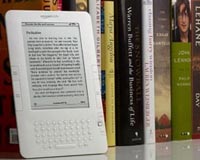 |
Taipei (AFP) April 2, 2010 The fevered buildup to Saturday's iPad launch has demonstrated the brute efficiency of the little-known Asian suppliers responsible for turning Apple's design vision into hands-on reality. Taiwanese touch-screen makers, South Korean chip producers and Chinese battery manufacturers have been adding workers by the hundred to staff extra factory shifts and meet double the forecast demand. Along the way, the component makers have navigated technical hurdles posed by a product that Apple boasts will remake personal computing with its large, tactile colour screen, super-long battery life and suite of applications. "iPad suppliers currently forecast eight to 10 million shipments in the calendar year 2010, up from prior expectations of five-plus million," Morgan Stanley analyst Katy Huberty said in a research note. The iPad, like the iPhone and iPod before it, is the totemic offspring of a globalised economy where components and assembly are sourced to low-cost, high-speed manufacturers, with little regard for geography. Simplo Technology Co. is Taiwanese but makes components for Apple at its plant in Changshu, in eastern China's Jiangsu province, and has recently shifted into overdrive to fulfill orders for iPad batteries. Tapping China's massive labour market, the plant's "Apple Manufacturing Department" has added 700 workers since Lunar New Year in mid-February and now employs 1,800 people. "The product has a tight deadline, and we've been increasing staff numbers to make it," said an executive at the department, giving her surname as Zhou. "The output of the iPad battery is now 50 percent higher than it was in January," she said. As a rule, Apple's Asian partners are loath to talk, bound by confidentiality agreements and the California company's notorious reluctance to allow outsiders a glimpse of its inner workings. But in Taiwan alone, 20 enterprises are involved one way or the other in making the iPad, according to Jonathan Luo of the Topology Research Institute, a private think-tank in Taipei. Millions of iPads will be assembled in China by Taiwan-based Foxconn, also known as the Hon Hai Group, according to numerous analysts and technology websites. Taiwan's Catcher Technologies manufactures the device's silver casing, Novatek Microelectronics makes LCD drivers, and Dynapack International makes batteries, Luo said. South Korea's Samsung, the world's biggest electronics group, is widely believed to have a hand in the super-fast processor that drives the iPad, along with lesser known chip foundries in Taiwan. The multitude of suppliers is part of Apple's strategy of having ample back-up mechanisms in place, ensuring delivery even when the unexpected happens. One example is the production of the high-resolution touch-screen, which is new territory for Apple and its suppliers due to its 9.7-inch (25-centimetre) size. "Most of the components in the iPad are mature items," said Mars Hsu, a Taipei-based analyst with Grand Cathay Securities. "The only component that may have had production problems is the touch-screen." The main supplier has been TPK Touch Solution. But in a possible indication of technical obstacles, Apple appears to have switched at least some of its screen orders to Wintek, Hsu said. Both TPK and Wintek declined to comment. Overall, while customers are set to discover whether all of Apple's furious hype is worth it, the iPad has shown what the global integrated economy can engineer in a short space of time. Shipment appears to be "right on track regardless of the recent strong rush of demand", said Dean Daeyun Lim, a Hong Kong-based technology analyst with Mirae Asset Securities. burs-ph/jit
Share This Article With Planet Earth
Related Links Space Technology News - Applications and Research
 Amazon strikes twin electronic book deals: WSJ
Amazon strikes twin electronic book deals: WSJSan Francisco (AFP) March 31, 2010 Amazon.com is letting two more major publishers raise prices of electronic books for Kindle readers in deals struck just days before Apple releases rival iPad computer tablets, the Wall Street Journal reported Wednesday. The agreements with Simon & Schuster and Harper-Collins break from Amazon's practice of holding the price of popular new titles down to 9.99 dollars each, according to the n ... read more |
|
| The content herein, unless otherwise known to be public domain, are Copyright 1995-2010 - SpaceDaily. AFP and UPI Wire Stories are copyright Agence France-Presse and United Press International. ESA Portal Reports are copyright European Space Agency. All NASA sourced material is public domain. Additional copyrights may apply in whole or part to other bona fide parties. Advertising does not imply endorsement,agreement or approval of any opinions, statements or information provided by SpaceDaily on any Web page published or hosted by SpaceDaily. Privacy Statement |